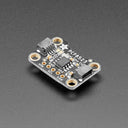Adafruit PCF8523 Real Time Clock (RTC) Breakout Board
by Adafruit





This is a great battery-backed real time clock (RTC) that allows your microcontroller project to keep track of time even if it is reprogrammed, or if the power is lost. Perfect for data-logging, clock-building, time stamping, timers, and alarms, etc. Equipped with PCF8523 RTC - it can run from 3.3V or 5V power & logic!
Adafruit have had a breakout board version of this RTC for a while, but they want to make it even easier for folks to use, so now it comes with STEMMA QT connectors for plug-and-play simplicity.
Works great with an Arduino using the RTC library, with CircuitPython, or with a Raspberry Pi (or similar single board linux computer)
- PCB & header are included
- Plugs into any breadboard, or you can use wires
- Two mounting holes
- Will keep time for 5 years or more
Note: This product does not come with a CR1220 coin cell battery.
The PCF8523 is simple and inexpensive but not a high-precision device. It may lose or gain up to 2 seconds a day. For a high-precision, temperature compensated alternative, please check out the DS3231 precision RTC.
To make life easier so you can focus on your important work, Adafruit have taken the sensor and put it onto a breakout PCB along with support circuitry to let you use it with 3.3V (Feather/Raspberry Pi) or 5V (Arduino/ Metro328) logic levels. Additionally, since it speaks I2C you can easily connect it up with two wires (plus power and ground!). They've even included SparkFun qwiic compatible STEMMA QT connectors for the I2C bus so you don't even need to solder! QT Cable is not included, but we have a variety in the shop. Just wire up to your favorite micro and you can use the CircuitPython/Python or Arduino drivers to easily interface with the PCF8523.
Comes as a fully assembled and tested breakout plus a small piece of header. You can solder header in to plug it into a breadboard, or solder wires directly.
TECHNICAL DETAILS
Check out this detailed guide for code, libraries, schematics, Fritzing object and more!
This board/chip uses I2C 7-bit address 0x68
Product Dimensions: 25.4mm x 17.8mm x 7.8mm / 1.0" x 0.7" x 0.3"
Product Weight: 1.5g / 0.1oz
-
Adafruit PCF8523 Real Time Clock (RTC) Breakout Board
ADA5189Out of stock£4.25
Shop with confidence – we've been serving the hobbyist electronics, Maker, and retro gaming communities since 2012.
- Satisfaction or refund guarantee
- Worldwide shipping via mail or courier
- 57,000+ customer reviews
- Secure website and payments
